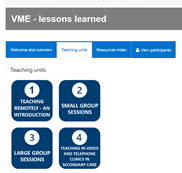Spotlight: Clinical Medical Education Online
Moving clinical medical education into an online forum

Jeremy Webb is a GP who works as Clinical Sub Dean at the School of Clinical Medicine, where he leads on Staff Development. He has completed a Master's in Medical Education and was awarded the Pilkinton Prize for teaching in 2014.
Jeremy is also the Director of the Postgraduate Certificate programmes in Medical Education at the Institute of Continuing Education, which has now developed into an MSt programme. He still supervises and teaches medical undergraduates weekly on the Graduate Medical Course in Cambridge. He is a Fellow at Wolfson College.
Teaching Medical Education at Cambridge
There are several programmes for medical educators in Cambridge run by the School of Clinical Medicine, some jointly with the Institute of Continuing Education (ICE). They are designed to support health professional in developing their role as teachers.
The Foundation-level programme, Integrated Foundations of Medical Education, was started about eight years ago and is free to all staff who teach medical (and veterinary) undergraduates at Cambridge, the regional hospitals, and GP practices within the East of England. It is now completed by over 150 people each year. We then set up the Postgraduate Certificate in Medical Education with ICE, just recently increasing the capacity to 90 per year, and now run a Postgraduate Diploma and MSt (Master of Studies) programme as well.
Delivery Pre-Covid
All of our postgraduate teaching courses are workshop-based and require face-to-face teaching. Teaching of medical undergraduates, in clinical years especially, is done in small groups with patients present - in hospitals, primary care - as well as through a lot of small-group seminars and tutorials, large-group lectures, and clinico-pathological conferences hosting up to 300 students at once.
All Change
When the pandemic struck we had to stop all face-to-face teaching. However, we were determined not to stop teaching altogether and felt that we needed to adapt our programmes to support our learners. We had a lot to learn in a short space of time, having never heard of Zoom back in February, and having planned to invest in online resources over the next academic year.
The Motivation
There are lots of resources available to help people in all disciplines learn how to develop their teaching using remote learning platforms. However, busy clinicians - many of whom were having to deal with the effects of the Covid-19 pandemic - were not going to have time to read all of the materials that were out there. The Medical Education Faculty, a close-knit and supportive group, therefore decided to design a resource which pulls together guidance in one place, in a brief but usable format, and demonstrates practical and pragmatic context- and subject-specific solutions.
Enlisting the support of other medics with particular expertise, we developed a resource called Virtual Medical Education (VME), which launched in July for all of our teaching staff. It is designed to introduce clinicians to some simple methods to encourage and support them in converting face-to-face teaching so that it can be delivered effectively via remote platforms.

We are not experts: we want to share good and effective practice.
We very much feel that we are not experts in remote teaching delivery, but that - like many people during the pandemic - we have had to adapt to support our learners and our teachers. We call the resource "VME - Lessons Learned", making clear that this is not a dogmatic or expert-led resource, but a forum for clinicians to share ideas and methods of teaching delivery that have worked with each other, as well as an honest reflection of what does not work!
Lessons Learned and a New Approach
You cannot just deliver your usual teaching online without thinking about how it is delivered.
It soon became apparent that simply delivering a lecture or seminar that you would previously have done in a face-to-face setting will not work in the remote context. It became clear that you need to limit the content that you include during the remote session time, and instead think much more about the process by which you deliver the teaching.
We decided to standardise a lot of the teaching to reflect this, and moved to the "flipped classroom" approach, where some of the content is delivered in advance of the live session. The session itself is then designed to maximise discussion and interaction between the learners and the teacher, who has to learn how to break content up into small chunks, and how to use the remote learning platform to encourage learner engagement and interaction.
We modelled the format like a good meal: starter, main and dessert! This allows us to cover as much ground as ever but without cramming too much into content-heavy online presentations. So far we have seven units on VME, designed to support learners in the common situations in which they will be teaching: each one has followed the same pattern.

Starter: Purposeful Observation
The learners are given the starter before the live session: they are provided with a combination of resources including reading as well as video clips, such as real patients talking about their own experiences of different illnesses. The students are given 'advanced organisers' - instructions for working through the materials with specific guidance to help them focus on the most important aspects for the context.
Main: Learner-Centred Webinars
The learners then come to the live session with some prior knowledge of the content, which means that the session itself can be more interactive, with a combination of clinical narratives, quizzes and sample examination-style questions to help the learners develop their clinical reasoning skills.
Dessert: Reflection and Application
At the end of the session the learners are encouraged to reflect on what they have learnt, as well as think about what else they need to learn. Suggestions are given for where they can find out more, such as national guidelines on clinical management or written reference texts.
Feedback
Evaluation from learners so far has largely been very positive. The undergraduates have preferred the format of receiving information in advance of the session, and like having to prepare for the session. The patient videos have been particularly popular. The postgraduates have missed the group learning in workshops, but have enjoyed (and requested more use of) the breakout room opportunities in remote sessions.
The faculty have so far been incredibly supportive, and we managed to enlist presenters for the VME units whilst interviewing health care staff for the Postgraduate Certificate - so far we have had some amazing contributions from them.
The Journey So Far
We had wanted to develop online resources for medical education for the last five years. The pandemic accelerated this process and, although it was a struggle, in just three months and counting we saw an exponential rise in high-quality resources which have made our own learning platforms much more comprehensive. It has moved us to think about new and more effective ways of teaching and learning. We continue to follow the mantra: "It's not what you teach that matters, it's what the learner learns".
Cambridge Teaching & Learning Newsletter vol. 2 (issue 1) December 2020
